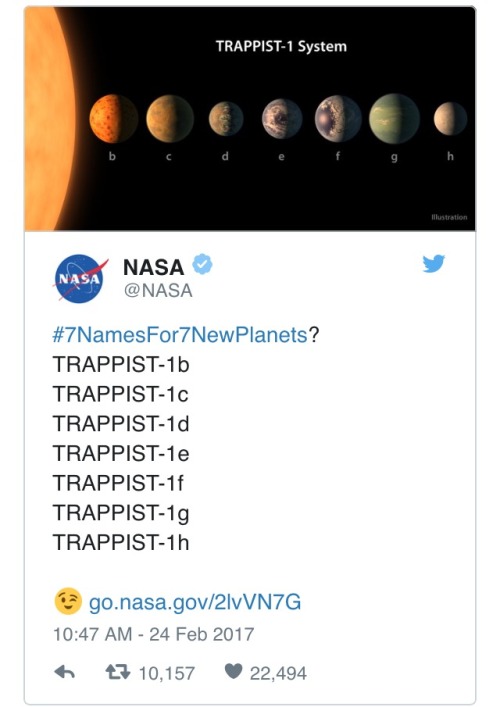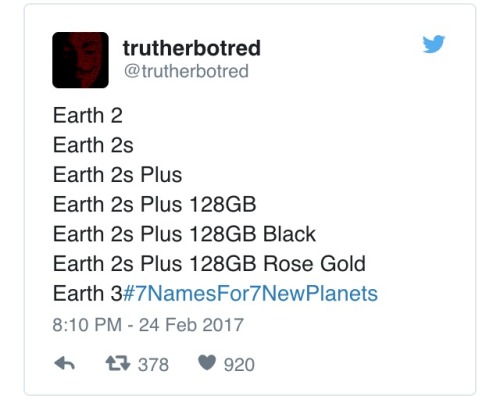We’ve Observed Binary Asteroids Before, But It’s Incredibly Rare To See Two That Are The Same Size




We’ve observed binary asteroids before, but it’s incredibly rare to see two that are the same size orbiting each other like this! Like all near-Earth asteroids, it’s believed these are remnants of our solar system’s formation. You can read more about these two here: http://www.astronomy.com/news/2018/07/rare-equal-mass-binary-asteroid-discovered-near-earth
More Posts from Plutoisnotaplanet and Others

message from pluto 3
click this link for a video explaining why i’m not a planet: https://youtu.be/lXMskKTw3Bc




Jupiter has 12 newly discovered moons!! I really relate to Valetudo, for some reason…









NASA asks Twitter to name the new planets.
love hack: find the anticodon to your codon
10 Times More Galaxies!
The universe suddenly looks a lot more crowded…
We already estimated that there were about 100 billion galaxies in the observable universe, but new research shows that this estimate is at least 10 times too low!

First, what is the observable universe? Well, it is the most distant part of the universe we can see from Earth because, in theory, the light from these objects have had time to reach Earth.

In a new study using surveys taken by the Hubble Space Telescope and other observatories, astronomers came to the surprising conclusion that there are at least 10 times more galaxies in the observable universe than previously thought. This places the universe’s estimated population at, minimally, 2 trillion galaxies!

The results have clear implications for galaxy formation, and also helps shed light on an ancient astronomical paradox – why is the sky dark at night?
Most of these newly discovered galaxies were relatively small and faint, with masses similar to those of the satellite galaxies surrounding the Milky Way.

Using deep-space images from the Hubble Space Telescope and other observatories, astronomers converted the images into 3-D, in order to make accurate measurements of the number of galaxies at different epochs in the universe’s history.
In addition, they used new mathematical models, which allowed them to infer the existence of galaxies that the current generation of telescopes cannot observe. This led to the surprising conclusion that in order for the numbers of galaxies we now see and their masses to add up, there must be a further 90% of galaxies in the observable universe that are too faint and too far away to be seen with present-day telescopes.

The myriad small faint galaxies from the early universe merged over time into the larger galaxies we can now observe.
That means that over 90% of the galaxies in the universe have yet to be studied! In the near future, the James Webb Space Telescope will be able to study these ultra-faint galaxies and give us more information about their existence.

So back to the question…Why is the sky dark at night if the universe contains an infinity of stars? Researchers came to the conclusion that indeed there actually is such an abundance of galaxies that, in principle, every patch in the sky contains part of a galaxy.
However, starlight from the galaxies is invisible to the human eye and most modern telescopes due to other known factors that reduce visible and ultraviolet light in the universe. Those factors are the reddening of light due to the expansion of space, the universe’s dynamic nature, and the absorption of light by intergalactic dust and gas. All combined, this keeps the night sky dark to our vision.
Make sure to follow us on Tumblr for your regular dose of space: http://nasa.tumblr.com
Chocolate bar in Microwave (Part-II)
This diagram of the electromagnetic spectrum finds it place in all physics textbooks:

Source
But the problem was I never got a physical sense of what that meant. It remained ‘yet another physics diagram’ for a really long time.
You see, unlike sound which can be neatly visualized using Schlieren imagery


Source: NPR
or by other unconventional innovative means,

I had no idea how to even get started with electromagnetic waves.
Visualizing the microwave wavelength using a chocolate and an oven (although not my original idea) arose out of this need to understand microwaves a little better. (Check out part-I of this post)*

But you can do more with some better but less delicious equipment.
You can get a couple of neon bulbs from an electronics shop and place them in a grid inside the microwave to view the standing wave while the microwave is in action

Source
This tells you how the heat is distributed at the bottom of the microwave oven. The lit bulbs are anti-nodes and unlit ones are the nodes .
You can also try (NOT recommended) to do this by placing a light bulb inside a cup of water instead of a neon bulbs.


Better quality gif - here
As you can clearly see the bulb only lights up in the anti-node regions of the standing wave while the remaining regions are the nodes.
You can take this a step further if you have an infrared camera .
Mark Rober had this brilliant idea of using the infrared camera inside a microwave in order to ensure that food that is being microwaved is cooked evenly and completely on the inside.

Source
And ElectroBOOM then took this to the next level by placing a cardboard box inside a microwave oven and looking at the heat map using a infrared camera.


Source: ElectroBOOM
That last gif my dear friends was the most satisfying physics animation that I had ever seen for a really long time ! It clearly illustrates the 3D standing wave heat map that is produced inside a microwave oven.
Although these aren’t the only ways to visualize the standing microwave pattern inside a microwave oven, but these are the ones that I was able to test them out with equipment that you can probably find at home or at school/university.
You are welcome to suggest more thought experiments, alternate methods or edits to this post, I would highly appreciate it!
Have a good one!
* Previous post: Chocolate bar in Microwave (Part-I)
** Why is wavelength of light important than its frequency ?
-
 hayleylovesjessica liked this · 2 weeks ago
hayleylovesjessica liked this · 2 weeks ago -
 cherryspoetry liked this · 1 year ago
cherryspoetry liked this · 1 year ago -
 winterlynette liked this · 1 year ago
winterlynette liked this · 1 year ago -
 likedpostsarchive reblogged this · 3 years ago
likedpostsarchive reblogged this · 3 years ago -
 curiouscuriouserr liked this · 3 years ago
curiouscuriouserr liked this · 3 years ago -
 rnablob liked this · 4 years ago
rnablob liked this · 4 years ago -
 aka-alias liked this · 4 years ago
aka-alias liked this · 4 years ago -
 slowlybeautifulprincess liked this · 4 years ago
slowlybeautifulprincess liked this · 4 years ago -
 yeetskeetiwandelete liked this · 4 years ago
yeetskeetiwandelete liked this · 4 years ago -
 uberboobera liked this · 4 years ago
uberboobera liked this · 4 years ago -
 imineffible liked this · 4 years ago
imineffible liked this · 4 years ago -
 noreasonisreasonenough reblogged this · 5 years ago
noreasonisreasonenough reblogged this · 5 years ago -
 xyloid-devices liked this · 5 years ago
xyloid-devices liked this · 5 years ago -
 strange-in-motion liked this · 5 years ago
strange-in-motion liked this · 5 years ago -
 thesullenwordsmith liked this · 5 years ago
thesullenwordsmith liked this · 5 years ago -
 solaeirr liked this · 5 years ago
solaeirr liked this · 5 years ago -
 class42warship liked this · 5 years ago
class42warship liked this · 5 years ago -
 tacticalbuttcheeks reblogged this · 5 years ago
tacticalbuttcheeks reblogged this · 5 years ago -
 tacticalbuttcheeks liked this · 5 years ago
tacticalbuttcheeks liked this · 5 years ago -
 crap-copper liked this · 5 years ago
crap-copper liked this · 5 years ago -
 evilazfuck-blog liked this · 5 years ago
evilazfuck-blog liked this · 5 years ago -
 jojojomoo35 liked this · 5 years ago
jojojomoo35 liked this · 5 years ago -
 chocolateforlife17 liked this · 5 years ago
chocolateforlife17 liked this · 5 years ago -
 silverblue94 liked this · 6 years ago
silverblue94 liked this · 6 years ago -
 winterscage liked this · 6 years ago
winterscage liked this · 6 years ago -
 thegirlnoonetexts liked this · 6 years ago
thegirlnoonetexts liked this · 6 years ago -
 bdhhwbeghdjd-blog liked this · 6 years ago
bdhhwbeghdjd-blog liked this · 6 years ago -
 pink-unicorns-love-cookies liked this · 6 years ago
pink-unicorns-love-cookies liked this · 6 years ago -
 pluspina liked this · 6 years ago
pluspina liked this · 6 years ago -
 asceovenspades liked this · 6 years ago
asceovenspades liked this · 6 years ago -
 guil-t-pleasurez liked this · 6 years ago
guil-t-pleasurez liked this · 6 years ago -
 rndomdragon liked this · 6 years ago
rndomdragon liked this · 6 years ago -
 starweird03 liked this · 6 years ago
starweird03 liked this · 6 years ago -
 lenientravesty liked this · 6 years ago
lenientravesty liked this · 6 years ago -
 purpledaydream2002-blog liked this · 6 years ago
purpledaydream2002-blog liked this · 6 years ago -
 m0rningstrk liked this · 6 years ago
m0rningstrk liked this · 6 years ago -
 sarcasticapplepie liked this · 6 years ago
sarcasticapplepie liked this · 6 years ago -
 kevinjustdoesnt reblogged this · 6 years ago
kevinjustdoesnt reblogged this · 6 years ago -
 mrandmrscat liked this · 6 years ago
mrandmrscat liked this · 6 years ago -
 beatitimreading liked this · 6 years ago
beatitimreading liked this · 6 years ago
welcome to my space space (see what i did there) (space means two different things)
232 posts



